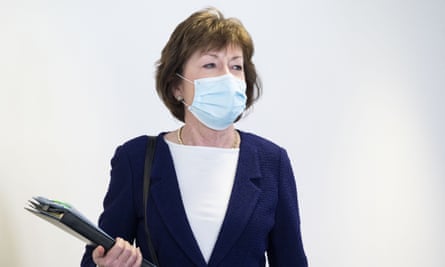Just three months ago, centrist Democrats were panicking. After strong performances in Iowa, New Hampshire and Nevada, the Vermont senator Bernie Sanders appeared poised to sail away with the nomination for president. Some in the party feared the self-identified democratic socialist would wreak havoc down the ballot.
“If Bernie Sanders was at the top of the ticket, we would be in jeopardy of losing the House,” the Louisiana congressman Cedric Richmond, a co-chair of Joe Biden’s campaign, said on a February conference call. “We would not get the Senate back.”
The world looks different now – and so does the Senate map. With Biden the presumptive nominee and Donald Trump facing widespread criticism for his handling of the coronavirus crisis, election experts say the upper chamber is up for grabs.
Republicans hold a 53-47 advantage, meaning Democrats will have to flip at least three seats to take the majority, assuming they win the White House. If they can’t win the presidency, they will need four seats to control the Senate. Doug Jones, a Democrat, is considered an underdog for re-election in Alabama. If he loses, Democrats will need another Republican seat.
But Jones’s race is one of only a few chances for Republicans to flip a seat themselves. Other Democrats up for re-election, such as Gary Peters in Michigan, have started to pull ahead. The map is unfavorable for Republicans, with incumbents facing difficult re-election races in presidential battleground states like Arizona, Colorado and North Carolina.
“Over the course of the last several months the playing field has gotten a little bit bigger, and I’d say Democratic prospects in some of these individual races have also seemed to get a little bit better,” said Kyle Kondik, managing editor of Sabato’s Crystal Ball at the University of Virginia Center for Politics.
“The overall race for the Senate is more of a coin flip than maybe you would have described it at the start of the cycle.”
Democrats have managed to expand the map, in part thanks to Biden clearing the presidential primary field, which seems to have improved the party’s prospects in states Trump carried in 2016, such as North Carolina and Georgia.
“A lot of Democrats were rightly worried that if you had a more progressive nominee, an avowed Democratic socialist on the ticket like Bernie Sanders, flipping a state like North Carolina … would have been much harder,” said Jessica Taylor, Senate and governors editor for the Cook Political Report.
Republicans are on defense in states they previously thought safe, most notably Montana. The state’s Democratic governor, Steve Bullock, launched his Senate campaign in March. A recent poll showed him leading the Republican incumbent, Steve Daines, by seven points, even though Trump carried Montana by 20 in 2016.
“I think the Democrats have done a better job of putting more races in play than the Republicans have,” Kondik said, “although Republicans are just defending many more seats.”
Democratic candidates have seen better fundraising numbers, which party strategists say is a reflection of grassroots energy. For example, in Maine, in the first quarter of this year, Sara Gideon raised nearly three times as much money as the Republican senator Susan Collins.

Incumbent Republicans face the same challenge as the president: the financial devastation caused by the pandemic has robbed them of their best talking point – the strength of the US economy. As the unemployment rate climbs and many Americans lose health coverage, Democratic strategists are quick to point out that the administration has stayed in a lawsuit from Republican state attorneys general which seeks to overturn the Affordable Care Act.
“Senate Republicans, right now, today, support a lawsuit that could toss out critical protections for people with pre-existing conditions,” said Benjamin Ray, senior director of campaign communications for the Democratic group Emily’s List.
“It might sound unconscionable to kick people that have gotten sick in a global pandemic off of their health insurance, but it’s what incumbent Republicans want.”
Democratic strategists insist Republicans are also suffering as a result of Trump’s handling of the coronavirus crisis and his party’s refusal to criticize him for it.
Last month, the National Republican Senatorial Committee, Senate Republicans’ campaign arm, circulated a 57-page memo which instructed candidates: “Don’t defend Trump, other than the China Travel Ban – attack China.”
After the Trump campaign lashed out, the committee was forced to backtrack, saying there was “no daylight between the NRSC and President Trump”.
The NRSC did not offer a comment to the Guardian.
Helen Kalla, a spokeswoman for the Democratic Senatorial Campaign Committee, said: “Republican senators have completely tied themselves to the president, and now they’re on the hook and own the failed coronavirus response.”
With a majority of Americans expressing disapproval of Trump’s handling of the crisis, Democrats say Senate Republicans will suffer the consequences in November.
“It is very clear what the Republican agenda is,” Kalla said. “I don’t think voters are going to forget it.”


